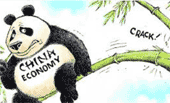| |
|
| |
|
 |
Supply
Chain by the Numbers |
| |
|
| |
- Aug. 15, 2019 -
|
| |
|
| |
|
| |
|
| |
Bill Gates Wants to Sprinkle Chalk Dust in Sky; More CPG Sector Woes; Chinese Manufacturing Feeling Tariff Impact; Rates for Distribution Space Continue to Head Higher |
| |
|
| |
| |
| |
| |
800 |
|
That's about the number of planes that would fly every day for an unclear period of time sprinkling tons of chalk dust to a height of 12 miles above the Earth's surface in an effort to counteract global warming. The idea is that dust would create a gigantic solar shade, reflecting some of the sun's rays and heat back into space, decreasing the strength of those that get through, thus protecting Earth from the effects of global warming. Crazy idea you say? We'll note the project is being funded by billionaire and Microsoft founder Bill Gates and was pioneered by scientists at Harvard University. In fact, the plans are so well advanced that the initial 'sky-clouding' experiments were meant to have begun months ago, the UK's DailyMail reports. But the tests were scuttled, with growing concerns about the ancillary effects such dusting could create. For example, one fear is that spreading dust into the stratosphere may damage the ozone layer that protects us from dangerous ultraviolet radiation. Other climatologists are concerned that such an effort could unintentionally disrupt the circulation of ocean currents that regulate our weather, unleashing a global outbreak of extreme climatic events that might devastate farmland, wipe out entire species and foster disease epidemics. Yikes. We say for now, let's try some other approaches. |
|
|
| |
| |
|
|
|
That was the year over year increase in lease rates per square foot in Q2 for US industrial space – primarily meaning warehouses and distribution centers. That is two percentage points above the average growth in rates, according to a new report from real estate firm CBRE. That put the average rate across the US at $7.50 per square foot – but there are huge variances across markets. Among the several dozen individual markets CBRE tracks, the highest lease rate was found on the San Francisco peninsula, at a whopping $36.90 per square foot. Contrast that with the cheapest markets, Greenville, SC and Memphis, TN, both with rates of just $3.38 per square foot. Rates in other notable markets were as follows: $4.96 in Atlanta; $8.01 in Northern New Jersey; $4.34 in Indianapolis; $4.70 in Dallas; $5.64 in Reno; and $10.58 in Los Angeles. |
| |
| |
|
| |
| |
4.8% |
 |
That was the growth in industrial production in July in China – the lowest level since 2009 in the middle of the severe financial crisis. That provides more evidence of a slowing global economy – and that the US tariffs on Chinese imports are having a real impact on Chinese economic fortunes. The trade environment is causing Chinses manufacturers to scale back production and investment, to the point that Spencer Fung, CEO of global trading giant Li & Fung, recently said Chinese manufacturers "are desperate." Overall Chinese growth continues to be reported as being about 6.5%, conveniently in the 6-6.5% range targeted by the government, but many analysts are saying the real number is less than half of that. The nation's industrial sector has lost five million jobs in the past year, China International Capital Corp. said in a research report in July, attributing 1.8 million to 1.9 million jobs losses to the trade war with the US. How this will all end is a real mystery.
|
| |
| |
| |
| |
| |
|
|
|
| |
 |
 |
| |
|
|
| |